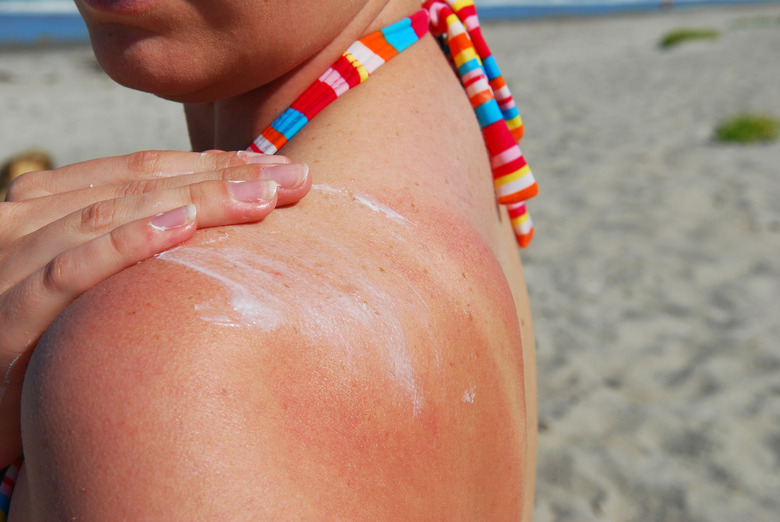What Happens When You Get A Sunburn?
Between trips to the beach, backyard BBQs and, of course, your annual camping trip, chances are you'll be catching some serious rays this summer. And if you're not careful about slathering on the SPF, you know what that means – a killer sunburn that dampens the next (several) days' fun.
But why you do you get a sunburn, anyway? There's the obvious answer – you spent too much time in the sun, duh! – but a lot of what you feel from a sunburn has to do with your body's natural response to the initial burn.
Here's what's going on – and why you need SPF for protection.
Let's Start with the Basics: What Causes a Sunburn?
The sun doesn't just emit heat and visible light, it also emits other forms of radiation. That includes ultraviolet (UV) rays. UV light has a short wavelength – too short to see, but short enough to penetrate some tissues, like the first layers of your skin.
And when that UV light hits your skin cells? It damages your DNA. Specifically, it makes some minor changes in the way the subunits that make up your DNA can pair up – and means your cells can't replicate your DNA properly until the damage is fixed.
TL;DR (Too Long; Didn't Read)
**Already kind of a DNA genius?** **Here are more deets.** You know how your DNA is made up of four base pairs – thymine, adenine, cytosine and guanine – and that thymine and adenine naturally pair up on either strand of the double helix? Well, UV radiation changes the structure of some of the thymine in your DNA, which means it can't pair with adenine correctly.
Got It – So Where's the Sunburn Come In?
Well, your cells don't like unwelcome DNA damage – it contributes to chronic diseases, which is why sun exposure is one of the driving forces behind skin cancer! – and the sun damages other parts of your cells, too. UV radiation also causes other damage.
Sun exposure damages the lipids that make up your cells (which, FYI, is also why your skin feels dry AF after you've been in the sun), and they also mutate your RNA. The damaged cells want to get rid of that damaged RNA, ASAP, so they throw it out of the cell – where it triggers an immune response.
Once your immune system is involved, you'll notice that painful swelling, heat and redness that's oh-so-familiar. Your immune response is the strongest (and the pain is the worst) for the first three days after your burn, then it should subside, even if your symptoms aren't totally gone.
Depending on how bad the burn is, you might be in for days (or more than a week) of peeling. And while it can be a bit uncomfortable – and, let's be honest, a little gross – it's actually healthy. Peeling means your body is sloughing off the skin cells too damaged to be repaired, so you can get back to healthy skin.
And, you'll probably notice a tan develops after your burn. That's all thanks to a protein called melanin, which offers some natural sun protection. When your body gets the signal that you need more sun protection – say, after you just got a massive sunburn – it starts making more melanin so you're better protected next time.
What About Severe Sunburns?
All the info above applies to any type of sunburn – but, of course, some sunburns are worse than others. While any sunburn will cause some redness and swelling, severe damage can have, well, severe consequences.
If you really went overboard in the sun, the UV rays could damage your skin so badly your body has to mount a massive immune response. The immune response could cause severe fluid buildup in the burn that causes you to develop blisters. And the immune response could also make you feel sick and even develop a fever.
So apply that SPF! Any remember: All sun exposure has the potential to permanently damage your DNA and contribute to your cancer risk later on. So stay safe by picking an FDA-approved sunscreen, and reapplying every two hours or after you go into the water. You'll avoid the nastiness of a painful sunburn and reduce your risk of scary skin cancer down the road.
Cite This Article
MLA
Tremblay, Sylvie. "What Happens When You Get A Sunburn?" sciencing.com, https://www.sciencing.com/what-happens-when-you-get-a-sunburn-13719339/. 28 May 2019.
APA
Tremblay, Sylvie. (2019, May 28). What Happens When You Get A Sunburn?. sciencing.com. Retrieved from https://www.sciencing.com/what-happens-when-you-get-a-sunburn-13719339/
Chicago
Tremblay, Sylvie. What Happens When You Get A Sunburn? last modified March 24, 2022. https://www.sciencing.com/what-happens-when-you-get-a-sunburn-13719339/
